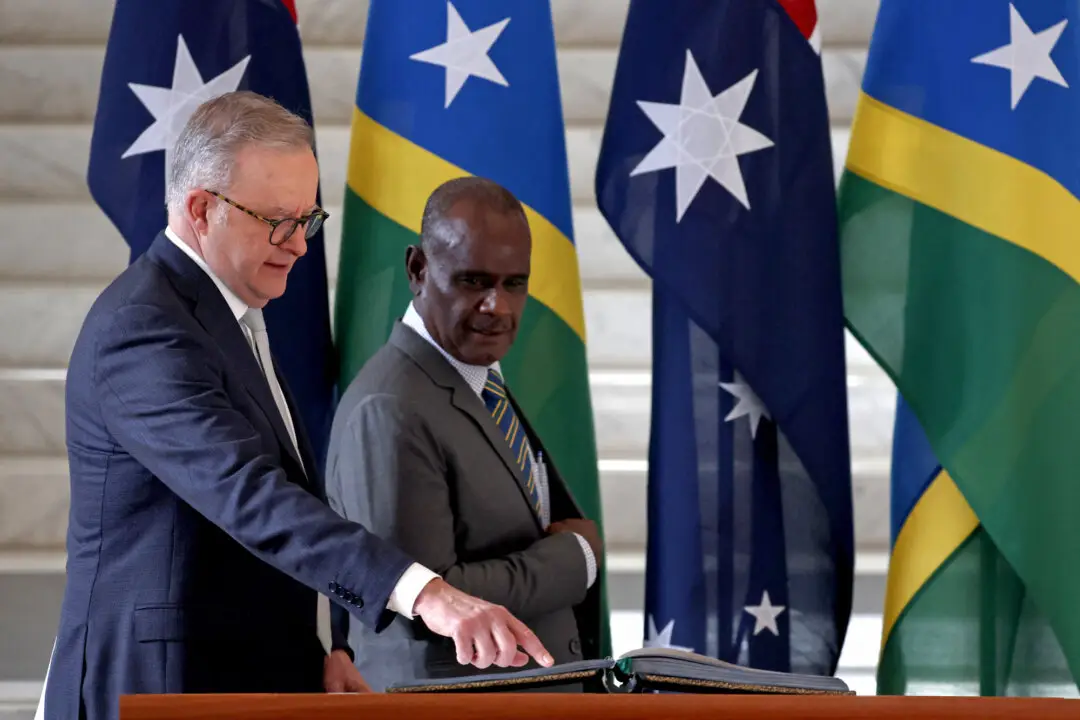Canberra signed three deals in 12 days with Pacific nations to ensure bilateral security, financial services and people to people connections.
Australia has signed three deals in 12 days with Nauru, Papua New Guinea (PNG), and the Solomon Islands to counter China’s increasing footprint in the Pacific region.
The latest came on Dec. 20 with the Solomon Islands to help expand its police force.
Australian Prime Minister Anthony Albanese and Solomon Island’s Prime Minister Jeremiah Manele said in a joint statement on Friday that Australia will provide a package of support to increase the size and ability of the Royal Solomon Islands Police Force (RSIPF).
“The support responds to Solomon Islands’ strong desire to build an enduring sovereign security capability, thereby reducing its reliance on external partners over time,” said Albanese’s office.
The deal, which the Australian prime minister said is worth about $190 million Australian ($118 million U.S.), includes support for a new sovereign police training center in Honiara.
The Solomon Islands signed a secret security pact with China in 2022, which raised concerns about China’s increasing influence in the country, particularly about Beijing setting up a military stopover there.
Friday’s deal doesn’t mention the Solomon Islands altering existing agreements with China. Ian Hall, a Professor of International Relations at Australia’s Griffith University, told The Epoch Times in an email that Australia is giving Honiara multiple choices for security tie-ups.
“Canberra is working hard to provide South Pacific states with alternatives to Chinese assistance and with reasons to work with Australia, New Zealand, the US, and other like-minded partners,” said Hall.
Deal with PNG
Australia’s focus on countering Chinese influence in the South Pacific by providing alternatives particularly appears to have sped up before the year-end as it signed a deal with PNG on Dec. 12 for bilateral security and another to help establish its National Rugby League (NRL) team.
“The Agreement elevates, broadens and modernises our longstanding security relationship, ensures consultation on security-related developments and allows us to work even more closely together to contribute to the region’s security,” said Albanese and PNG’s Prime Minister James Marape in a joint statement about the security deal.
Australia’s NRL is extremely popular in PNG and another joint statement on the same day by Albanese and Marape announced the deal to deepen connection through Rugby league. The deal is worth about $600 million Australian ($380 million U.S.) over a decade.
“The establishment of a PNG team in the NRL is an important symbol of our contemporary partnership,” said the joint statement, adding that the deal will promote rugby league from the grassroots to the elite level across PNG, Fiji, Samoa, and Tonga.

The intervention will boost school retention, promote positive health and nutrition, build gender equality, and foster youth leadership.
“It will deliver significant economic benefits to both countries through investment in new infrastructure and by boosting PNG and Australia’s sports and tourism sectors,” said the statement.
Pat Conroy, Australia’s minister for international development and the Pacific, said publically in a TV interview with ABC Australia on Dec. 12 that PNG will not sign a security pact with China and Australia remains its “security partner of choice.”
“So, that strategic trust underpins this agreement,” Conroy told journalist Sarah Ferguson. “And obviously there’s a clause in this agreement that allows the Commonwealth to withdraw funding and the NRL will be required to withdraw the franchise. I don’t see that ever happening.”
Deal with Nauru
A few days before the Australia-PNG treaty was signed, Canberra stuck another deal on Dec. 9 with Nauru, a tiny island nation to its north-east with only 12,780 citizens. The deal was signed by Albanese and Nauru’s President David Waiau Ranibok Adeang.
Albanese and Conroy said in a joint statement with Nauru’s Minister of Foreign Affairs, Penny Wong, that the deal will help secure Nauru’s long-term economic resilience and security.
Nauru’s only bank, Bendigo, announced last year that it would quit the country by this year’s end but delayed that after a Chinese state-owned bank emerged as its replacement. However, the deal between Albanese and Adeang quickly came to Nauru’s rescue, and it was announced that Bendigo, an Australian financial institution, would be replaced by the Commonwealth Bank of Australia.
“Through the treaty, Australia will ensure Nauruans have ongoing access to vital banking services and to the international financial system. The Commonwealth Bank of Australia will provide banking services in Nauru, including a physical presence, following the departure of Bendigo Bank next year,” said the joint statement.
The deal ensures Australia’s participation in Nauru’s security, banking, and telecommunications sectors, and Canberra will be consulted on issues related to Nauru’s critical infrastructure.
“Nauru has also committed that third party engagement in critical infrastructure will not be used for security purposes,” said the statement adding that Australia will also provide $40 million Australian ($ 25 million U.S.) over five years for Nauru’s policing and security.
In QUAD’s Spirit
Hall said the three deals with the Solomon Islands, PNG, and Nauru, come as part of Australia’s strategic thrust to counter China’s sway over the region and its people.
“Sometimes this [counter strategy] can involve doing things that China cannot, like building an elite rugby league team in PNG, and sometimes this means doing things that China is offering to do, like training the Solomon Islands police,” he said.
It also strengthens Australia’s commitment to the QUAD alliance’s focus on the Indo-Pacific region.
QUAD, or the quadrilateral alliance, comprises Australia, the United States, India, and Japan. Its main focus has been to strategically and economically counter China’s policies in the wider Indo-Pacific region.
“This is all in the spirit of the Quad, which is also trying to ensure that countries in the wider Indo-Pacific region have choices when it comes to bolstering their maritime security or building infrastructure or training their public servants,” said Hall.
Associated Press contributed to this report

